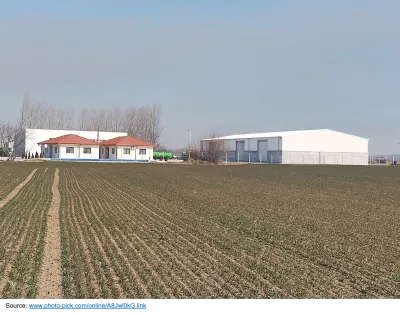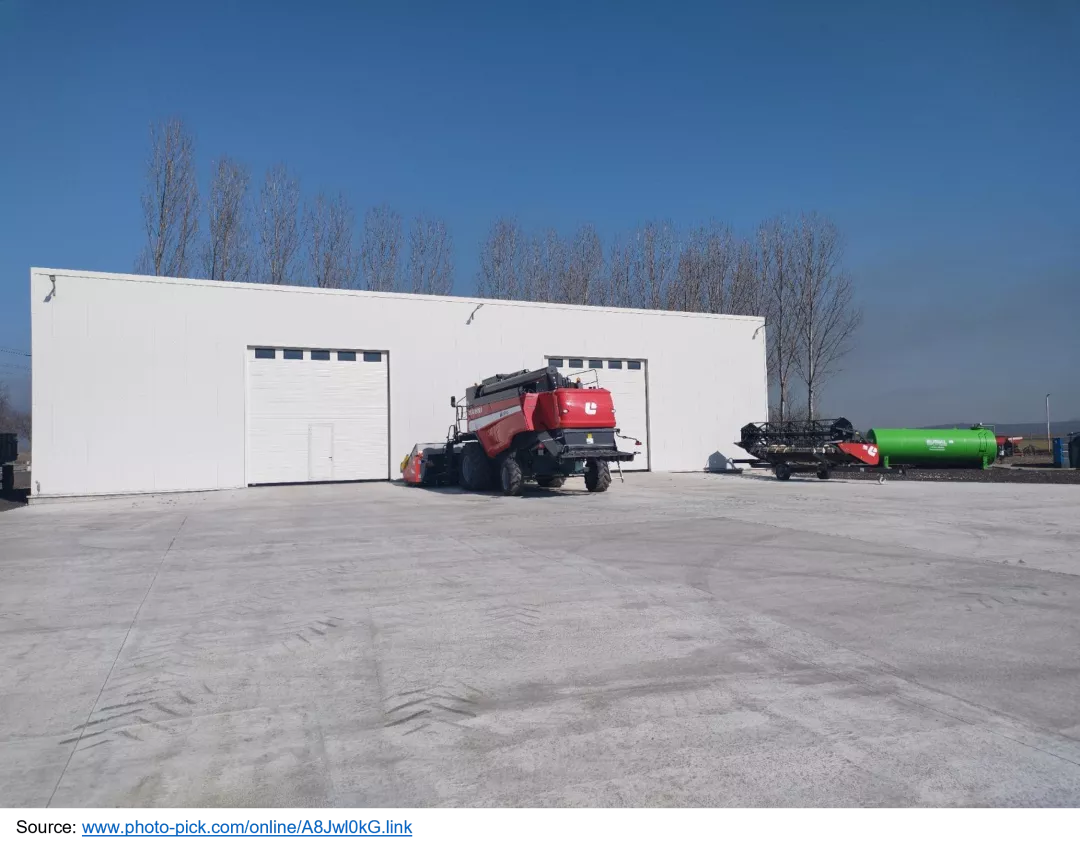General information
RDP Priority
- P2. Competitiveness
RDP Focus Area
- 2A: Farm’s performance, restructuring & modernisation
RDP Measure
- M04: Investments in physical assets
Summary
Cătălin Gabriel Cohin owns an agricultural holding in the village of Plopu and, realising that EU funding could be triggered through farm investment, Mr Cohin sought to reinforce the resilience of his farm by investing in its future.
He received just under EUR 1 million in grant funding for his project. His own and privately sourced contributions equated to 26% of the total project costs.
From this investment, the construction of an agro-industrial unit comprising barn, machinery shed, office and facility blocks, and equipment was finalised in 2020. This represented an important local investment that provided benefits and jobs for the whole community.
Results
The following results were achieved:
- Four permanent jobs created.
- New farm facilities constructed, including a 979 m2 grain storage barn, 320 m2 shed for the storage and maintenance of farm equipment and an 84 m2 office.
- The effectiveness of the agricultural production processes was improved through the purchase of high-performance equipment improving the processing, storage and preparation of the products on-farm.

Promoter
Cătălin Gabriel Cohin, PFA
Funding
Total budget 1 347 120 (EUR)
EAFRD 848 267 (EUR)
National/Regional 149 694 (EUR)
Private/Own funds 349 159 (EUR)
Ressources
Context
The parish of Murighiol and its seven villages are situated in the expansive, peripheral rural area of the Danube Delta Biosphere Reserve in Romania. The activities specific to the area are agriculture, fishing, tourism, agri-tourism and trade.
Cătălin Gabriel Cohin owns an agricultural holding in one of the villages of Murighiol, called Plopu. This small village is home to around 550 residents and its overall infrastructure and services are in poor condition, creating barriers for investment and for attracting essential professions. Entrepreneurial development is slow and the young people from Plopu prefer to look for work in more attractive and lucrative locations.
In 2017, the village of Plopu in the Danube Delta region of Romania undertook several regeneration projects to improve its facilities and public spaces. Feeling inspired to contribute to the improvements of his village and realising that EU funding could be triggered through farm investment, Mr Cohin sought to reinforce the resilience of his farm by investing in its future.
Objectives
The aim of the project was to improve the performance of the farm holding through modernisation to help increase its competitiveness. Improved agricultural production would be gained through diversification and product quality would be prioritised through improved storage and processing facilities on-farm. Specific project objectives were to:
- Improve the general performance of the agricultural holding.
- Restructure the holding and transform it into a commercial holding.
- Comply with relevant standards and thereby increase the added value of products through improved storage and primary processing on-farm.
Activities
Activities before the funding application was approved:
- Contracting an expert firm to draft the investment project plan for the new buildings, access routes, connections and equipment.
- Requesting the Environmental Protection Agency of Tulcea county to issue a permit for the proposed construction, development and subsequent exploitation activities confirming that the project would not endanger the environment.
Activities during project implementation:
- Organising the construction site, connecting the site to the electrical network and the water supply and erecting two 15 m2 metal containers for housing the construction materials and for the temporary storage of waste.
- Constructing the office building (84 m2).
- Building the facilities block that contains a canteen, kitchen, space for serving meals, changing room, wet room with toilets and showers and the guard's room (84 m2).
- Constructing the barn and storage space for the agricultural produce (979 m2).
- Building the shed for machinery and equipment (320 m2).
- Purchasing new equipment for harvesting, processing and packaging of cereals.
- Advertising and employing local staff for the permanent job positions (guard, administration, equipment maintenance).
- Promoting the holding and its products, as well as connecting with relevant stakeholders and agricultural networks to improve processing and distribution.
Main results
The following results were achieved:
- Four permanent jobs created (guard, administration and immediate equipment maintenance). During harvest time, more temporary jobs are created, for people from Plopu and the rest of Murighiol commune.
- One barn constructed (979 m2) for the storage of grain.
- One shed constructed (320 m2) for the storage and maintenance of farm machinery and equipment.
- One office building constructed (84 m2).
- One facilities block built (84 m2).
- In addition, the effectiveness of the agricultural production processes was improved through the purchase of high-performance equipment improving the processing, storage and preparation of the products on-farm.
Key lessons and recommendations
- The completion of this project inspired another farm holder in Tulcea county to develop a similar project and to also seek funding from EAFRD (a ‘Centre for the storage of ecological cereals’). This demonstrates how important it is to facilitate the transferability of projects. Well-promoted examples of good projects can thereby create an effective snowball effect.
- The project was implemented around the same time when the Murighiol commune developed its local regeneration development strategy. This circumstance had a good motivational impact and fostered integrated local development.
- Given that the agricultural holding is situated in the Danube Delta Biosphere Reserve and near a special avifaunistic protection area, obtaining the environmental permit was essential for the approval of the project. The permission also contained important information for the EAFRD application form.
"We operate an agricultural area of 205 hectares. Production differs from year to year depending on a number of factors, but for example in wheat we had average yields of 5-7 tonnes per hectare. We had this funding opportunity due to the RDP 2014-2020 through the ITI mechanism, and with a lot of work, we managed to complete the project successfully.
We purchased agricultural machinery, and the construction of storage facilities helps us capitalize on grain production when the market offers us a good price."
Cohin Cătălin Gabriel
